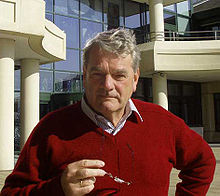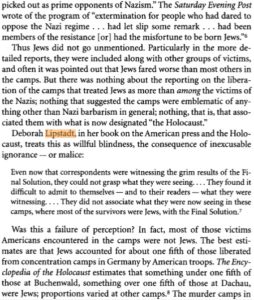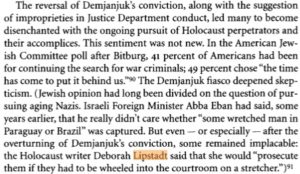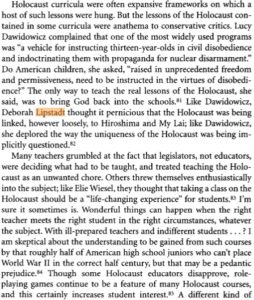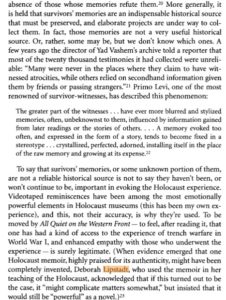I enjoyed this movie. “Acclaimed writer and historian Deborah E. Lipstadt must battle for historical truth to prove the Holocaust actually occurred when David Irving, a renowned denier, sues her for libel.”
Deborah Lipstadt is portrayed by a beautiful actress (Rachel Weisz) while David Irving is portrayed by a creepy-looking actor (Timothy Spall). The real life David Irving looks similar to actor Tom Wilkinson who is in the movie but curiously given the role of the barrister attacking Irving.
Rachel Weisz, Deborah Lipstadt
Deborah Lipstadt
David Irving
Tom Wilkinson

NEW YORK, NY – JANUARY 06: Actor Timothy Spall attends the 2014 National Board of Review Gala at Cipriani 42nd Street on January 6, 2015 in New York City. (Photo by Gilbert Carrasquillo/FilmMagic)
The film makes clear that Lipstadt had unlimited funds and legal help at her disposal while Irving represented himself. Lipstadt’s team poured through Irving’s diaries to find a few passages to discredit him. Who has written an honest diary who would not be embarrassed to have parts of it read aloud in court?
Wikipedia: “Lipstadt hired the British solicitor Anthony Julius to present her case, while Penguin Books hired Kevin Bays and Mark Bateman, libel specialist from media firm Davenport Lyons. They briefed the libel barrister Richard Rampton QC and Penguin also briefed junior barrister Heather Rogers. The defendants (with Penguin’s insurers paying the fee) also retained Professor Richard J. Evans, historian and Professor of Modern History at Cambridge University, as an expert witness. Also working as expert witnesses were the American Holocaust historian Christopher Browning, the German historian Peter Longerich and the Dutch architectural expert Robert Jan van Pelt. The latter wrote a report attesting to the fact that the death camps were designed, built and used for the purpose of mass murder, while Browning testified for the reality of the Holocaust.”
In his book, The Holocaust in American Life, Peter Novick has some sharp observations on Lipstadt’s work:
Deborah Lipstadt is more moderate than others when she describes Allied policy as merely “bordering on complicity” in the Final Solution. What prevented Auschwitz from being bombed, says Lipstadt, was the “deep antipathy” toward “contemptible” Jews held by key figures in Washington and London. David Wyman, perhaps the most cited member of the prosecution team, is at one with Lipstadt in seeing anti-Semitism at the core of the “abandonment.”
Forward Editor Jane Eisner writes:
The role of memory, and its fraught relationship to fact and truth, is threaded through Lipstadt’s legal battle with Irving, and so through “Denial,” the new film dramatizing that epic British courtroom struggle. The film debuted at the Toronto Film Festival and will open in select cities in the United States on September 30. Starring Rachel Weisz as Lipstadt, it’s based on Lipstadt’s book recounting her ordeal, “History on Trial: My Day in Court With a Holocaust Denier.”
Though in the end victorious, Lipstadt faced a legal saga that was filled with uncertainty and marked by intense loneliness. In the United Kingdom, the burden of proof in a libel case is on the accused, so it was up to Lipstadt and her British legal team to prove that Irving was wrong; that the Holocaust had, indeed, occurred, and that Jews were its intended victims. Lipstadt, then and today still a professor at Emory University, had put everything on the line to defend herself against the claims of a man who was driven by prejudice and anti-Semitism but also knew how to construct a cunning and cynical argument.
“History on Trial” was published in 2005, and it eerily resonates today. The rise of anti-Semitism in Europe and the surge of derogatory Holocaust-related tropes on social media perpetrated by extremists in this country raise a similar quandary: How do you deal with those who deny history, who disregard factual evidence, who seem to care little for the truth? And can this one film — a solid, interesting, at times gripping film, but one not destined for blockbuster status — help counter an ugly narrative?
The contemporary echoes were one reason that Weisz, whose parents fled from the Nazis, wanted the part. “Obviously, the Holocaust being on trial is just a very outlandish notion to me,” the British-born actress said during an interview in a Manhattan hotel. “But the idea that there are objective truths, and there is a difference between opinion and fact — in the current climate of relativism, people just spout opinions as if they are facts! There doesn’t seem to be much respect for the difference of the two things. So I thought it was fascinating to put something on trial and prove it was irrefutably a fact and that someone’s opinion didn’t stand up.”
David Irving is a complicated chap. There’s an excellent five-part British miniseries “Selling Hitler” about the Hitler Diaries. Apparently, Irving lead the way in denouncing the diaries as fraudulent after first calling them genuine.
In 1983, Stern, a weekly German news magazine, purchased for 9 million marks the Hitler Diaries of 61 volumes and published excerpts from them. Irving played the major role in uncovering the Hitler Diaries as a hoax. In October 1982 Irving purchased, from the same source as Stern’s 1983 purchase, 800 pages of documents relating to Hitler, only to discover that many of the documents were forgeries.[52] Irving was amongst the first to identify the diaries as forgeries, and to draw media attention. He went so far as to crash the press conference held by Hugh Trevor-Roper at the Hamburg offices of Stern magazine on 25 April 1983 to denounce the diaries as a forgery and Trevor-Roper for endorsing the diaries as genuine.[53] Irving’s performance at the Stern press conference where he violently harangued Trevor-Roper until ejected by security led him to be featured prominently on the news; the next day, Irving appeared on the Today television show as a featured guest.[54] Irving had concluded that the alleged Hitler diaries were a forgery because they had come from the same dealer in Nazi memorabilia from whom Irving had purchased his collection in 1982.[52] At the press conference in Hamburg, Irving announced, “I know the collection from which these diaries come. It is an old collection, full of forgeries. I have some here”.[52] Irving was proud to have detected and announced the hoax material and of the “trail of chaos” he had created at the Hamburg press conference and the attendant publicity it had brought him, and took pride in his humiliation of Trevor-Roper, whom Irving strongly disliked for his sloppy work (not detecting the hoax) and criticism of Irving’s methods and conclusions.[55] Irving also noted internal inconsistencies in the supposed Hitler diaries, such as a diary entry for 20 July 1944, which would have been unlikely given that Hitler’s right hand had been badly burned by the bomb planted in his headquarters by Colonel Claus von Stauffenberg earlier that day.[56]
A week later on 2 May, Irving asserted that many of the diary documents appear to be genuine; at the same press conference, Irving took the opportunity to promote his translation of the memoirs of Hitler’s physician Dr. Theodor Morell.[55] Robert Harris, in his book Selling Hitler, suggested that an additional reason for Irving’s change of mind over the authenticity of the alleged Hitler diaries was that the fake diaries contain no reference to the Holocaust, thereby buttressing Irving’s claim in Hitler’s War that Hitler had no knowledge of it.[57] Subsequently Irving conformed when the diaries were declared as a forgery by consensus. At a press conference held to withdraw his endorsement of the diaries, Irving proudly claimed that he was the first to call them a forgery, to which a reporter replied that he was also the last to call them genuine.
David Irving is the subject of a great Wikipedia profile. He lost his libel lawsuit against Deborah Lipstadt. Here is David’s side.
Jack the Jew* emails:
David Duke of course came to his views on race through the KKK. It is easy to think of David Duke as a clown, but his views on Jews largely parallel Kevin MacDonald’s.
David Irving is a different case. He was a respected amateur historian and popular author about military matters. He is educated guy and a really talented writer. Because he speaks and reads German fluently, he has used original source material for his works. He is more responsible than anyone, other than Kurt Vonnegut, for publicizing British firebomb raid on Dresden (for fans of Pynchon’s Gravity’s Rainbow, it plays a significant part in that book as well). What happened with Irving is that in all of his original research, he was unable to come up with anything linking Hitler with direct orders to exterminate the Jews. He also minimized the number of Jews who were deliberately killed. (The numbers, even from established historians of the Holocaust, are all over the map. Arno Mayer, who wrote, Why did the Heavens not darken, in that book said that more Jews died of disease and other causes than were put to death in gas chambers in Auschwitz.)
Deborah Lipstadt wrote a book in which she called Irving a Holocaust Denier, lumping him with people who were explicit Holocaust deniers. Irving sued her in England for libel and lost. In the process Irving’s historical research was shredded by Richard Evans, another British historian of WWII and the Nazis, because Evans said that Irving had deliberately shaped his books and opinions by ignoring some facts and stressing others to reach a desired result.
This result of the trial pretty much ruined Irving’s reputation among serious historians. However, there are a number of points that really have to be made in Irving’s defense: Irving foolishly represented himself at trial whereas Libstadt’s team consisted of the best barristers in England paid millions of pounds by wealthy Jews including Spielberg. Evans was paid hundreds of thousands of pounds to testify as an expert witness, and in subsequent events, has been criticized by neutral sources as someone who has made serious errors in his own works. Irving made all of his source materials available to the defense and Lipstadt refused to turn over much of what she had that she based her claim in the book on.
Irving is probably the English speaking historian who knows the most about the Nazi leadership having read and translated Goebbels diaries, written a book on Goebels and on Himmler as well as on other aspects. Irving has also changed his views on the extent of the Holocaust. He still doesn’t think it can be attributed to Hitler, but does think that others in the leadership were involved, and he now concedes that there were extermination camps and that at least hundreds of thousands of Jews were killed.
Christopher Hitchens strongly supported Irving’s right to his opinions and his books. The question is always one of whether histories should be refuted by calling its author a racist or an anti-Semite or refuted with facts. Irving was not some crank pounding out tracts. He may have had an agenda as Evans testified, but if that is the case, identify the agenda as Evans did and show how Irving distorted the facts. However, that may be true for some of the parts of Irving’s works, its certainly not true for most of them.



